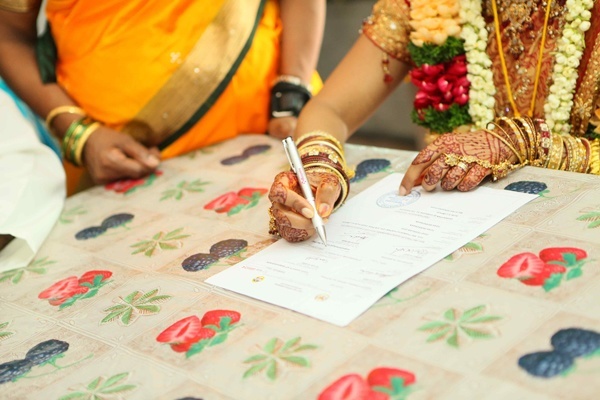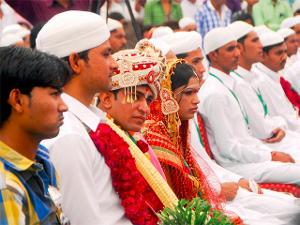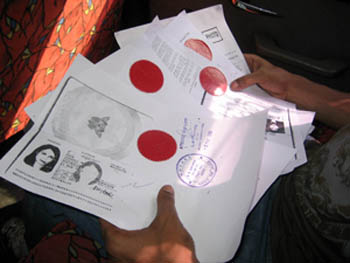Procedure for getting marriage certificate in India
 A marriage certificate is an official statement to declare that that two people are married and live together legally. A Marriage Certificate is the proof of registration of a marriage and it is the official record that two people have undertaken a marriage ceremony. This certification is very important to prove candidate that he/she is legally married to someone such as in obtaining a passport, changing your maiden name. To get the marriage certificate, firstof all candidates must have to register their marriage.
A marriage certificate is an official statement to declare that that two people are married and live together legally. A Marriage Certificate is the proof of registration of a marriage and it is the official record that two people have undertaken a marriage ceremony. This certification is very important to prove candidate that he/she is legally married to someone such as in obtaining a passport, changing your maiden name. To get the marriage certificate, firstof all candidates must have to register their marriage.
It is anauthoriseddocument which prove that candidate is married and the most significant document of a marriage. In 2006, the Supreme Court made it obligatory to register the marriage for the women security.
Indian Law for Marriage Registration:
Documents and process for Marriage Registration in India. Court has enacted a law that all endian marriages have to be registered. In 2013, the Indian Parliament modified the law that made registration of Indian marriages compulsory, irrespective of religion, caste or location in India.
 India has 5 marriage laws: In Indian scenario, Marriages can be registered either under the Hindu Marriage Act, 1955 or under the Special Marriage Act, 1954. Other marriage laws are Indian Christian Marriage Act 1889, Muslim Marriage Acts, Parsi Marriage and Divorce Act, 1936. Until mid-2013, marriage registration was compulsory for only weddings under the Hindu, Parsi and Special Marriage Acts. "Registration of Births and Deaths Act, 1969? was amended to make registration of marriage compulsory along with birth and death.
India has 5 marriage laws: In Indian scenario, Marriages can be registered either under the Hindu Marriage Act, 1955 or under the Special Marriage Act, 1954. Other marriage laws are Indian Christian Marriage Act 1889, Muslim Marriage Acts, Parsi Marriage and Divorce Act, 1936. Until mid-2013, marriage registration was compulsory for only weddings under the Hindu, Parsi and Special Marriage Acts. "Registration of Births and Deaths Act, 1969? was amended to make registration of marriage compulsory along with birth and death.
Except for marriages under the "Special Marriage Act, 1954", all registration of marriage in India can be done after a religious wedding ceremony has been performed.
In the case of India's Special Marriage Act (1954), the registration of marriage is also the formalisation of the marriage.
In terms of legislature in India, marriage and divorce are part of the "Concurrent List". This means that although consistency on laws for marriage and divorce throughout India are desirable, it is not essential.
Thus Indian states have different laws for marriage and divorce. Marriage registration process varies from state to state; but the changes are negligible.
Eligibility: Eligibility age to get marriage is 21 for male and 18 female
List of Documents for Registering a Marriage in India:
Below are the documents (application forms and proof) required for marriage registration in India.
- Marriage Registration Application Form (or Memorandum of Marriage)
- Affidavit by the Husband and Wife
- Proof of age of Husband and Wife. It can be Birth Certificate, Aadhar, Passport, Voter Id, PAN Card, Matriculation Certificate, and Domicile Certificate.
- Husband and Wife's proof of residence such as Ration Card, Aadhar Card, Passport, Election Voter Id, PAN Card, Utility bill like telephone/electricity.
- Individual Photos of the Husband and Wife and Marriage photos of both
- Certificate of religious marriage issued by a Priest, Pandit, Maulvi, Kazi, Iman, etc (This is in case of a religious wedding)
- Photo and Proof of Identity of 3 Witnesses (Ration Card, Aadhar Card, Passport, Election Voter Id, PAN Card, Driver's License, Utility bill like telephone/electricity.
- Wedding Card (If not present, then an affidavit on Stamp Paper with 3 witnesses)
- Divorce Decree Certificate (In case either or both spouses are divorcees)
- Death Certificate (In case of widow or widower marriage)
Detailed Info on Documents Required for Marriage Registration in India:
 The documentation, application form and process for marriage registration in India differ from state to state but there are slight differences. Most states require the following documents:
The documentation, application form and process for marriage registration in India differ from state to state but there are slight differences. Most states require the following documents:
Marriage Registration Application Form (or Memorandum of Marriage): Listed below is the Information in this document, along with supporting proof documents that need to be attached:
Name and Age of the Husband: Photocopy of identity proof of name and age (Aadhar, Passport, Voter Id, PAN Card, Birth Certificate, Matriculation Certificate, Domicile Certificate,etc)
- Name and Age of the Wife: Photocopy of identity proof of name and age has to be attached.
- of the Bride and the Groom: Individual photos of the husband and wife and wedding of both together.
- Date and Place of Marriage: Wedding card needs to be attached. In case of a religious wedding, certificate of religious marriage issued by the Priest, Pandit, Maulvi, Kazi, Iman, etc, who presided over the wedding.
- Particulars of the bridegroom: Full Name, Father's name, Mother's name, Age, Place of Residence, Address, Marital Status at the time of marriage, Signature. In case the groom is a divorcee, then copy of the divorce order needs to be attached. If he is a widower, then a copy of the death certificate of his wife needs to be attached.
- Details of the bride: Full Name, Father's name, Mother's name, Age, Place of Residence, Address, Marital Status at the time of marriage, Signature. If the bride is a divorcee, then copy of the divorce order needs to be attached. If she is a widow, then a copy of the death certificate of her husband needs to be attached.
- Details of 3 Witnesses at the wedding: Full Name of witness, Blood Relationship with the Bride or Groom (if any), Age, Place of Residence, Address, Signature. Note: Some states and territories expect that a Gazetted government officer should attend the wedding.
- Address of Husband or Wife: Address proof includes Ration Card, Aadhar Card, Passport, Voter Id, PAN Card,utility bill, etc. Address should be in the jurisdiction of the registrar office.
- Affidavit by the Husband and Wife: An Affidavit (or Application)should be submitted along with the Marriage Memorandum. The affidavit wording differs from state to state; but most affidavits have a declaration by the husband and wife stating that a valid marriage was solemnized between them and the information in the application form is correct.
Procedure to apply:
- For Marriage Registration under Hindu Act, candidates can apply at office of the Sub-Divisional Magistrate in whose jurisdiction the husband or wife resides on any working day.
- Second step is to properly fill the Application form duly signed by both husband and wife.
- Then, verification of all the documents is done on the date of application and a day is fixed for the appointment and communicated to the parties for registration.
- On the said day, both parties, along with a Gazetted Officer who attended their marriage, need to be present before the ADM. The Certificate is issued on the same day.
Application form of Marriage certificate can filled online also
For Online Registration, steps are also follows on website:
- Candidate must select district and continue.
- Fill in husband's details and choose "Registration of Marriage Certificate".
- Fill in Marriage Certificate form and choose date of appointment.
- Click "Submit Application"
Candidates will be allotted a temporary number that will be found printed on the acknowledgement slip and application form is done. - Take a printout of acknowledgement slip as well.
Appointment:
In case of Hindu Marriage Act, applicant will get an appointment within 15 days of the online registration, but in case of Special Marriage Act, it may take upto 60 days.
Witness are defined as any person who has attended the wedding of the couple and he/she must have a PAN Card and a Proof of Residence. 'Tatkal' Marriage Certificate: There is a provision of tatkal marriage certificate also
In April 2014, the Revenue Department of Delhi government announced a 'tatkal' service guaranteeing a single-day authorisation of the marriage under which the registration process will be undertaken on urgency.
The service, which became operational on April 22, 2014 facilitates citizens to register their nuptials and get a certificate issued within 24 hours on payment of Rs. 10,000 as a fee.
Benefits of Marriage Certificate:
 Marriage certificate is the need of today for every citizen to live and get many facilities from government. I will be beneficial if person is applying for a passport or opening a bank account after the wedding. In such case, marriage Certificate is required.
Marriage certificate is the need of today for every citizen to live and get many facilities from government. I will be beneficial if person is applying for a passport or opening a bank account after the wedding. In such case, marriage Certificate is required.
Marriage certificate is extremely helpful to obtain visas for both husband and wife.
For information that as the foreign embassies in India as well as in countries outside India, do not recognize traditional marriages, the Marriage Certificate is obligatory for the couple to travel abroad using a spouse visa.
Marriage certificate enables a spouse to claim life insurance return or bank deposits in case of demise of the Insurer or depositor without any nominee.
Precaution in registering marriage certificate:
First precaution is to check thrice the details filled in the Form A. Names of the bride and groom shall always be tallied with the names given in the passport/SSC and other certificates. Otherwise, at the time of issuance of visa and other certificates, applicant may have to face problem.
Candidates must check the certificate issued by the Sub Registrar office and if there are any discrepancies in the names or any other details, immediately bring them to the noticeof the Sub Registrar and get them rectified.
Restrictions of registration of marriages:
There are many restrictions under Hindu Marriage Act, 1955 and Special Marriage Act, 1954:
- Bridegroom or bride who desire to marry should not have married wife / husband
- Bridegroom or bride who cannot willingly give consent for marriages owing to mental illness are not eligible for marriage
- Marriage of those who are capable of giving consent for marriage but (d) incapable of getting child owing to unsound mind cannot be solemnised nor be registered
- Those suffering from insanity are ineligible for solemnisation of marriage
- Those who are within degree of prohibited relationship are ineligible for marriage provided they can marry if it is permitted according to the usage of custom or usage governing such persons.
- Bridegroom and bride who are offspring up to 5 generation from mother's side or father's side cannot marry (They are called Sapindas).
Time limit for marriage registration:
Marriage under Hindu or Parsi Marriage Act can be registered any time after marriage. There is no time limit. Now, in Andhra Pradesh and Telangana, the Sub Registrar (Marriage Officer) can register the Hindu marriage at any time and there is no procedure of condonation of delay by the District Registrar, which was there till recently.